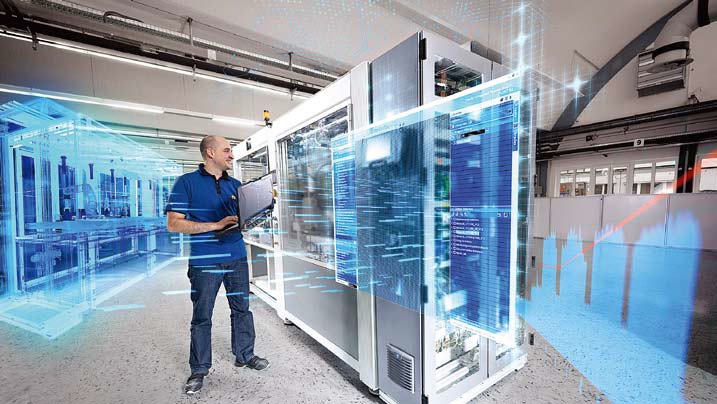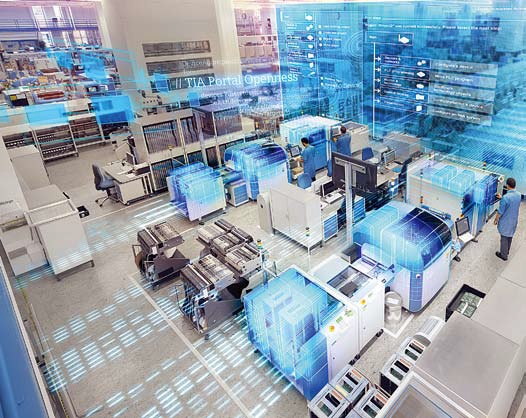Manufacturing is undergoing a digital transformation driven by smart technology and connected devices.
With opportunities to increase efficiency, productivity and accuracy in the industry, it is an excellent match for manufacturing.
In South East Asia, every manufacturing business is interested in what digital transformation could mean for his or her business. They believe digital transformation is key to future competitiveness, growth and agree that it will deliver better business results.
While there is an awareness of the importance of digital transformation in South East Asia, this has not yet fully translated into reality. Majority of the companies in the region are still not fully on board, suggesting that the digital transformation race has really only just started in South East Asia.
INTERNATIONAL METALWORKING NEWS FOR ASIA (IMNA) spoke to Bisheng Liu, Vice President, Digital Factory Customer Services, ASEAN, Siemens Pte Ltd, and Tindaro Danze, Vice President and Division Lead for Digital Factory and Process Drives, Siemens Vietnam about a range of products and solutions that support companies in their journey towards digitalisation.
 IMNA: Reports say that by the year 2025, automation software will replace 140 million full-time employees across the globe, are we in the brink of a jobless future?
IMNA: Reports say that by the year 2025, automation software will replace 140 million full-time employees across the globe, are we in the brink of a jobless future?
Bisheng: We are experiencing the next wave of industrialisation. The most important fact is that digitalisation does not necessarily mean that human workers will be replaced by machines; it actually helps plant operators’ work more effectively. The second most important fact is that digitalisation helps to shorten time to market of products, and also helps plant operators to be more flexible, which means we can now do more high-value work. The manpower that used to be positioned on the shop floor work, contributing to a value-creation environment. By enabling digitalisation, you can enhance productivity, and at the same time develop a more flexible and efficient production environment.
IMNA: In emerging countries in Asia, job shop owners and manufacturers conjure visions of massive machinery projects, huge capital expenses, and radical business process overhauls
when they hear the word automation. Can automation start on a much smaller scale?
Tindaro: Digitalisation is a concept, and every company will have their own vision of how they want to improve on their processes. Companies do not have to invest heavily at once to revolutionise their
factory. Some steps can be pertinent only to small shops and not for huge factories, and viceversa . The journey towards digitalisation varies based on factors such as type of company and industry, as well as country where it is based in.
Bisheng Liu
Manufacturers in South East Asia are faced with tougher competition and more challenges, whether they are local small and medium enterprises with small facilities, or multi-national corporations with bigger facilities. Regardless of size, companies are looking to increase competitiveness in the market and become stronger players in the regional and global markets.
Bisheng: Consumers are experiencing a higher demand for customised products to meet their specific needs. We have digitalisation concepts for companies across various industries. We propose effective
technology improvements to help customers optimise their manufacturing processes, and digitalise their assets and machineries to enable analytics to better manage operations on a facility-wide level. We deal with plants of different sizes and requirements. Here at Siemens, we educate our customers on what to expect in the current market, and what could happen in the future so that they can set a correct pace for their business.
IMNA: Is South East Asia ready to adopt advanced manufacturing?
Bisheng: Because of the ever-changing consumer demands, manufacturers are increasing flexibility in terms of creating products that meet individualised needs, and at a speed that is faster than competitors. In South East Asia, manufacturers are taking steps to enhance product quality, increasing plant efficiency and integrating protection technology in order to sustain energy, production cost and security.
 Tindaro:
Tindaro: Digital Enterprise is Siemens’ answer to Industrie 4.0. The Digital Enterprise Suite enables manufacturing companies to streamline and digitalise their entire business process, seamlessly integrating suppliers into the mix. They can begin at any point of their value chain, from product design to service, and can extend digitalisation gradually, depending on their current needs.
With the Digital Enterprise Suite, Siemens offers a comprehensive portfolio of software-based systems specifically for the discrete industries. It integrates and digitalises the complete value chain from product design, production planning, production engineering, and production execution to services. The result of the integration and digitalisation of the complete value chain is a perfect digital copy of
the value chain – the Digital Twin. This enables companies to perform simulation, testing, and optimisation in a completely virtual world – before ever committing any resources in the real world. The connection of the virtual and real worlds leads to shorter time-to-market as well as greater flexibility, quality, and efficiency.
Bisheng: Also included in Siemens’ Digital Enterprise offerings is MindSphere, the cloud-based, open Internet-of-Things operating system that forms the foundation and fulfils an essential condition for databased industrial services. As an open cloud platform for industrial applications, MindSphere opens up scope for the link-up of devices and plug-and-play connectivity using open standards. In addition to offering data analysis and versatile connectivity, it also supplies tools for developers, applications and services. MindSphere helps customers to evaluate and utilise their data in ways they had never previously envisaged – such as by optimising the performance of their operating equipment to achieve maximum availability. MindSphere also paves the way for completely new business models such as the sale of machine hours, while users profit from benefits such as a transparent pay-per-use pricing model. Tindaro Danze
To cater to customers in South East Asia, the company launched ZerOne.DesIgn, Digital Factory Manufacturing Design Consultancy. Officiated by Singapore’s Minister for Trade and Industry (Industry)
Mr S Iswaran, it is the first-of-its-kind for the controls and automation industry globally to offer such technical consultancy services to help companies achieve their Industrie 4.0 vision. The consultancy possesses the technical expertise to propose effective technology improvements to help customers optimise their manufacturing processes, and digitalise their assets and machineries to
enable analytics to better manage operations on a facility-wide level.

Nike Hypervenom Phantom II FG Low 
 IMNA: Reports say that by the year 2025, automation software will replace 140 million full-time employees across the globe, are we in the brink of a jobless future?
IMNA: Reports say that by the year 2025, automation software will replace 140 million full-time employees across the globe, are we in the brink of a jobless future? Tindaro: Digital Enterprise is Siemens’ answer to Industrie 4.0. The Digital Enterprise Suite enables manufacturing companies to streamline and digitalise their entire business process, seamlessly integrating suppliers into the mix. They can begin at any point of their value chain, from product design to service, and can extend digitalisation gradually, depending on their current needs.
Tindaro: Digital Enterprise is Siemens’ answer to Industrie 4.0. The Digital Enterprise Suite enables manufacturing companies to streamline and digitalise their entire business process, seamlessly integrating suppliers into the mix. They can begin at any point of their value chain, from product design to service, and can extend digitalisation gradually, depending on their current needs.














